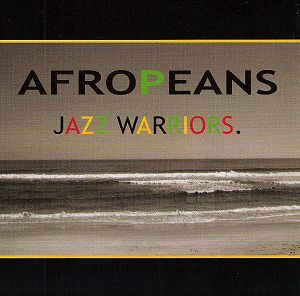1. Intro
2. Abolition Day
3. Remercier Les Travailleurs
4. Blak Flag
5. Apunta Un Lapiz
6. Crossing the Sands
7. Civilisation
8. We Are a Warrior
Courtney
Pine - Alto flute, bass clarinet, tenor sax,
shaker
Jason
Yarde - Soprano and baritone saxes, wind shaker
Nathaniel
Facey - Alto sax, finger cymbal
Shabaka
Hutchins - Clarinet, bass clarinet, tenor
sax, finger cymbal
Byron
Wallen - Trumpet, flugelhorn, tambourine
Jay
Phelps - Trumpet, flugelhorn, shekere
Chris
Storr - Trumpet, flugelhorn, tambourine
Harry
Brown - Trombone, cabasa
Alex
Wilson - Piano
Samuel
Dubois - Alto and bass steel pans, cabasa
Femi
Temowo - Electric and acoustic guitars
Ayanna
Witter Johnson - Cello, voice
Omar
Puente - Electric violin
Darren
Taylor - Double bass
Robert
Fordjour - Drums, Egyptian tabla
For this concert at London's
Barbican in October 2007, Courtney Pine revived
the Jazz Warriors to celebrate the bicentenary
of the abolition of the slave trade. Jazz
Warriors broke up acrimoniously in 1987 after
recording only one album. The personnel at
the Barbican concert was largely new but the
spirit was the same - assertive and celebratory.
And the band contains some excellent musicians
- notably violinist Omar Puente and steel
drummer Samuel Dubois. Their distinctive contributions
give a new, uplifting sound to the band and
the live recording captures the excitement
of the occasion.
The opening Intro
starts with a child's voice reciting words
spoken in 1712 by a slave-owner in Virginia:
"I am here to help you solve some of your
problems with slaves". Then Abolition Day
bursts forth with a positively exuberant rhythm,
punched along by the powerful brass and topped
by the steel pans and Pontyesque violin. These
latter instruments give the album much of
its distinction, although all the playing
is first-class.
Pianist Alex Wilson is featured
in Remercier Les Travailleurs, a tune
from Mali on which Alex makes his piano sound
like the kora (a stringed instrument). Blak
Flag (or is it Crossing the Sands?
- the outer sleeve disagrees here and elsewhere
with the inner sleeve!) erupts into free=form
anarchy but settles down when Samuel Dubois
is let loose on the steel drums and the rhythms
evoke the Caribbean as well as Africa. Harry
Brown's trombone solo accentuates the West
Indian feel with a reggae beat before the
music again descends into brawling chaos.
Omar Puente's violin is superb
on Apunta Un Lapiz, mixing lyricism
with mystery and outspoken passion. His unaccompanied
cadenza is one of the album's high spots.
After this, I started to
get really confused, because the track listings
are so inconsistent that it's almost impossible
to tell which tune one is hearing. Suffice
it to say that the vigour stays at a high
level, although the final We Are a Warrior
becomes a bit of a dirge. This is a fine album,
spoilt only by the careless documentation.
Tony Augarde
